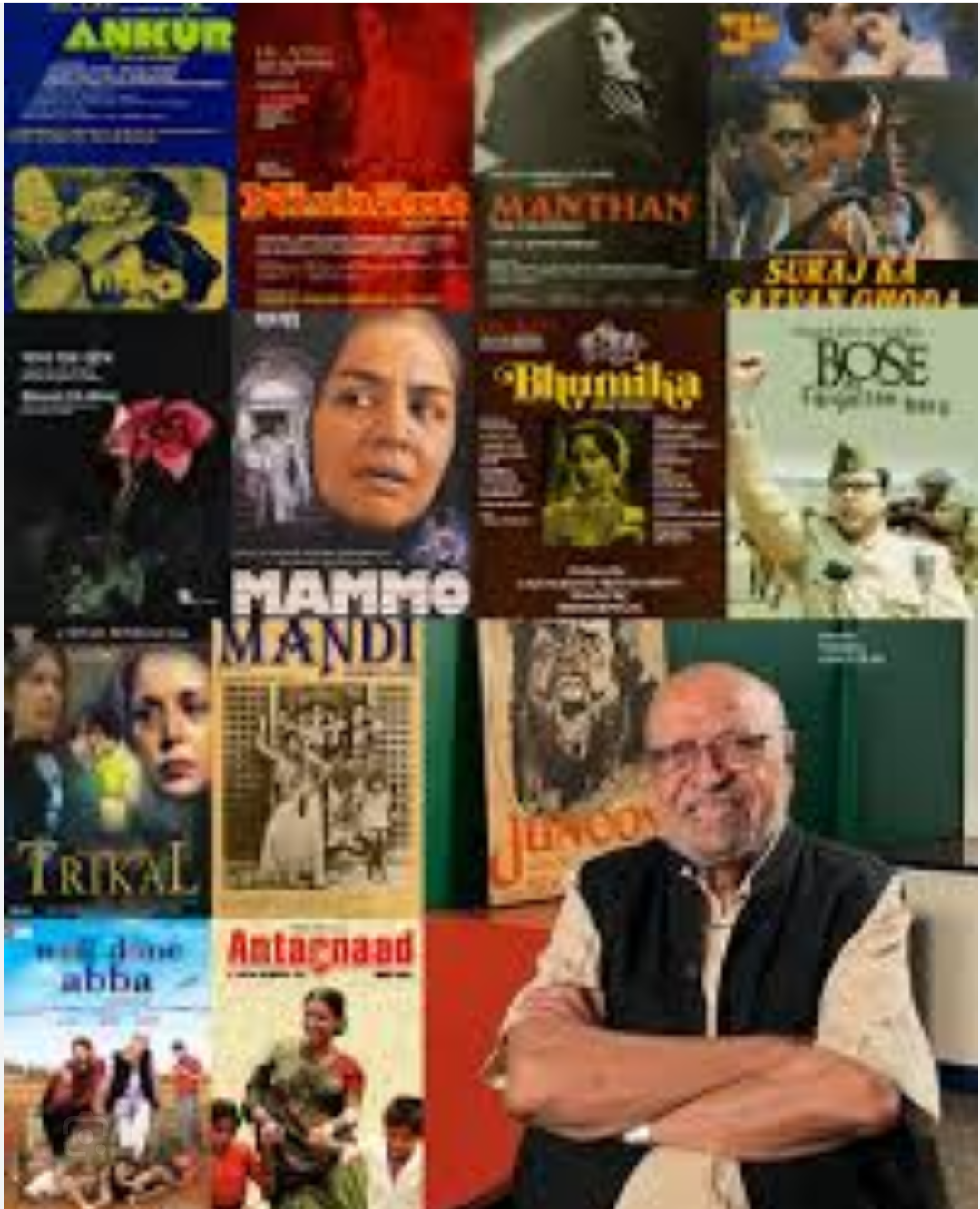
Shyam Benegal : 90 yrs!
Dec 23 2024
Veteran filmmaker Shyam Benegal, known for his remarkable contributions to Indian cinema, passed away at the age of 90 on December 23 in Mumbai. A pioneer of parallel cinema, Benegal’s work in both mainstream and art films earned him widespread acclaim for its realism, depth, and storytelling excellence. His passing marks the end of an era in Indian filmmaking.
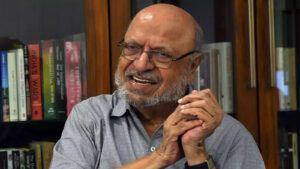
Shyam Benegal at 90: Celebrating a Legacy of Meaningful Cinema
Shyam Benegal, who turned 90 on December 14, is celebrated as one of India’s most profound filmmakers. Through his incisive storytelling and sharp socio-political critique, he transformed Indian cinema, presenting narratives that explored the human condition, historical transitions, and social inequities. Starting his career in advertising, Benegal rose to prominence with a series of films that deviated from mainstream Bollywood’s escapist formulas.
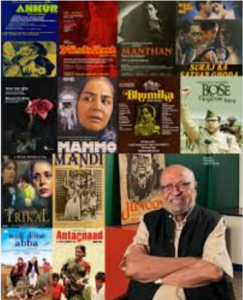
A Closer Look at His Iconic Films
1. Ankur (The Seedling, 1974): A Quiet Revolution
Benegal’s directorial debut, Ankur, was a landmark in Indian cinema, introducing realism and subtlety. The film explores themes of feudal oppression, caste discrimination, and gender inequality. Shabana Azmi made her debut as Lakshmi, a Dalit woman exploited by the landlord’s son (played by Anant Nag). The film’s quiet intensity and authentic portrayal of rural India shocked audiences and earned it critical acclaim. It is widely regarded as the beginning of India’s parallel cinema movement.
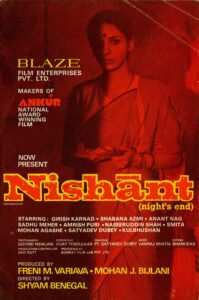
2. Nishant (Night’s End, 1975): The Power and Powerless
Nishant delves into the oppressive nexus of feudal lords, politics, and systemic corruption in rural India. It tells the story of a school teacher whose wife is abducted by a group of powerful landlords. The narrative explores moral ambiguity as the villagers’ uprising challenges the feudal system. The film received international acclaim and was nominated for the Palme d’Or at the Cannes Film Festival.
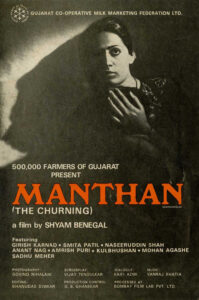
3. Manthan (The Churning, 1976): A People’s Film
Manthan remains one of the most unique films in Indian cinema’s history, funded by contributions from 500,000 farmers. It tells the story of the White Revolution in India, depicting the empowerment of rural farmers through the establishment of milk cooperatives. With Smita Patil and Girish Karnad in lead roles, the film is a tribute to grassroots activism. The iconic song “Mero Gaam Katha Parey” still resonates as a symbol of collective strength.
4. Bhumika (The Role, 1977): A Woman’s Journey
Based on the life of Marathi actress Hansa Wadkar, Bhumika is a feminist masterpiece. Smita Patil plays Usha, an actress navigating tumultuous relationships, career pressures, and societal expectations. The film reflects Benegal’s nuanced understanding of female agency and explores the price women often pay for their ambitions.
5. Junoon (Obsession, 1978): Love and War
Set during the Indian Rebellion of 1857, Junoon is a historical drama featuring Shashi Kapoor, Shabana Azmi, and Naseeruddin Shah. The story revolves around an obsessive love affair against the backdrop of colonial conflict. With Govind Nihalani’s evocative cinematography, the film captures the complex interplay between personal desires and historical upheavals. It won the National Film Award for Best Feature Film in Hindi.
6. Kalyug (The Machine Age, 1981): The Modern Mahabharata
A contemporary retelling of the Mahabharata, Kalyug portrays the corporate world as a battleground where business families vie for power and control. Starring Shashi Kapoor, Rekha, and Victor Banerjee, the film deconstructs the epic, showing how timeless themes of ambition and rivalry play out in modern contexts.
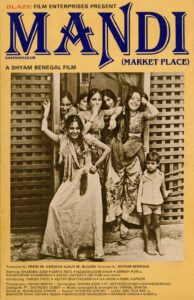
7. Mandi (The Marketplace, 1983): A Satirical Gem
Mandi is a dark comedy set in a brothel, exploring themes of exploitation, hypocrisy, and survival. Shabana Azmi plays the brothel’s madam, who faces challenges from politicians, businessmen, and reformers. The film’s humor underscores its biting critique of society’s moral double standards.
8. Trikal (Past, Present, Future, 1985): A Haunting Period Drama
Set in post-colonial Goa, Trikal is a tale of nostalgia, regret, and unresolved tensions. The story revolves around the Fonseca family as they grapple with the ghosts of their past, both figuratively and literally. Leela Naidu’s haunting presence and Om Puri’s outsider perspective anchor this richly atmospheric film.
9. Suraj Ka Satvan Ghoda (The Seventh Horse of the Sun, 1992): The Art of Storytelling
This experimental film, based on Dharmavir Bharati’s novella, dissects truth and memory through multiple narratives. Raghuvir Yadav plays a narrator recounting his relationships with three women. The nonlinear structure mirrors the fragmented nature of memory, making the film an intellectual and emotional experience.
10. Sardari Begum (1996): The Life Behind the Voice
This poignant film reconstructs the life of a singer, Sardari Begum (Kirron Kher), through the memories of those who knew her. A commentary on tradition, ambition, and societal expectations, the film reveals how a woman’s life is often reduced to stories told by others.
11. Zubeidaa (2001): A Fairy Tale’s Tragic End
Karisma Kapoor stars as Zubeidaa, a princess torn between her dreams and the harsh realities of patriarchy. The film, a part of Benegal’s “Muslim Trilogy,” examines the tension between personal freedom and societal constraints. With A.R. Rahman’s soulful score, Zubeidaa is as much a visual feast as it is an emotional journey.
Shyam Benegal art and Approach:
Shyam Benegal’s collaborations with cinematographer Govind Nihalani shaped the visual language of his films. Nihalani described their method as deeply integrated, with a focus on breaking down scenes before lighting to align aesthetics with the narrative. This meticulous approach brought authenticity to Benegal’s social commentaries.
Benegal also admired Satyajit Ray and Mrinal Sen, learning from their mastery of the cinematic medium. His documentary on Ray showcased his respect for the craft, highlighting how Ray believed in complete control over his work.
A Revolutionary Legacy
Shyam Benegal’s films remain a testament to the power of storytelling. Whether addressing gender, caste, or historical change, his narratives continue to resonate. As he turns 90, his work stands as a beacon of meaningful cinema, inspiring generations of filmmakers to prioritize substance over spectacle.
Article by
CJ Rajkumar
Author/ Cinematographer
